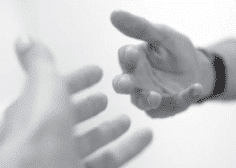From an outsider’s perspective, Christianity is perceived as a “thou shalt not” religion. Christianity is seen as a religion that simply restricts people’s lifestyles, forcing them to give up all the “good” things about a secular life. However, Christianity is more of a religion that encourages action than forbids it.
When challenged by the Pharisees in Matthew 22 about which commandment is the greatest, Jesus responded, “Love the LORD your God with all your heart and with all your soul and with all your mind. This is the first and greatest commandment. And the second is like it: Love your neighbor as yourself. All the Law and the Prophets hang on these two commandments.”
If we receive a gift from someone, it is natural to show some form of appreciation. After we have come to realize all that our Savior has done for us, we should want to show gratitude in some way. When we have learned to fully love God, we show our love, gratitude, and devotion through our deeds.

We may be busy earning money, studying, earning scholarships, playing sports, or just spending some time for ourselves. And it is important that we do these things; we are called to do our very best in everything that we do. After all, we would all go a little mad if we did not take time for ourselves to relax. Nonetheless, we must stop and recognize the duty that we as Christians have to help and be kind to others. Paul instructs those who trust in God to devote themselves to the doing of good deeds (Titus 3:8). Often, these deeds require the sacrifice of some of our time, money, or comfort.
When we embrace the teachings of Jesus to help others, we will realize how little we are able to do for others in comparison to what Jesus has done for us, how feeble our love is when compared with the love that our God has for us. We grow to learn that God is the reason and source of all our love. “Dear friends, let us love one another, for love comes from God. Everyone who loves has been born of God and knows God.” (1 John 4:7)
Many people do good things for each other because of the benefits that they receive, such as self-satisfaction, recognition and pleasure. Others do good works out of compliance or requirement. Whether we perform our actions for our own personal betterment or simply to help others, we are called to do so for the glory of God. Galatians 6:10 says, “Therefore, as we have opportunity, let us do good to all people, especially to those who belong to the family of believers.”
Actions truly do speak louder than words. It is simple for us to say that we love one another, yet rarely do we actually express our love to each other. We seldom take time out of our day to pay attention to someone who is neglected or sad. But when we do, it is clear to see what an effect taking such a simple action can have.
When others see our love reflected in our actions, they are able to see the love that our Father has for us. John 13:35 says, “By this everyone will know that you are my disciples, if you love one another.” By simply being kind and helpful to one another, we can effectively minister to the rest of the world through the presentation of the love of God.
If we try to say a kind word to those we meet, smile at those who frown, speak with those who are lonely, and help those who need it, the love that we are trying to convey to others will be felt stronger in ourselves. By passing on these feelings, we reaffirm their presence in ourselves, and we are better able to understand the love that Jesus has for us. As we are told in 1 John, it is because of the Father’s love for us that we are able to love. Christ’s death on the cross is the ultimate portrayal of love and sacrifice.
If God was willing to send his Son to die, and Jesus was willing to suffer the humiliation of becoming human and being crucified out of love for us, we should be willing to help others in some small way.
Taylor Brandsma is a senior at Immanuel Christian High School. She is a member of Trinity URC in Lethbridge, AB.
